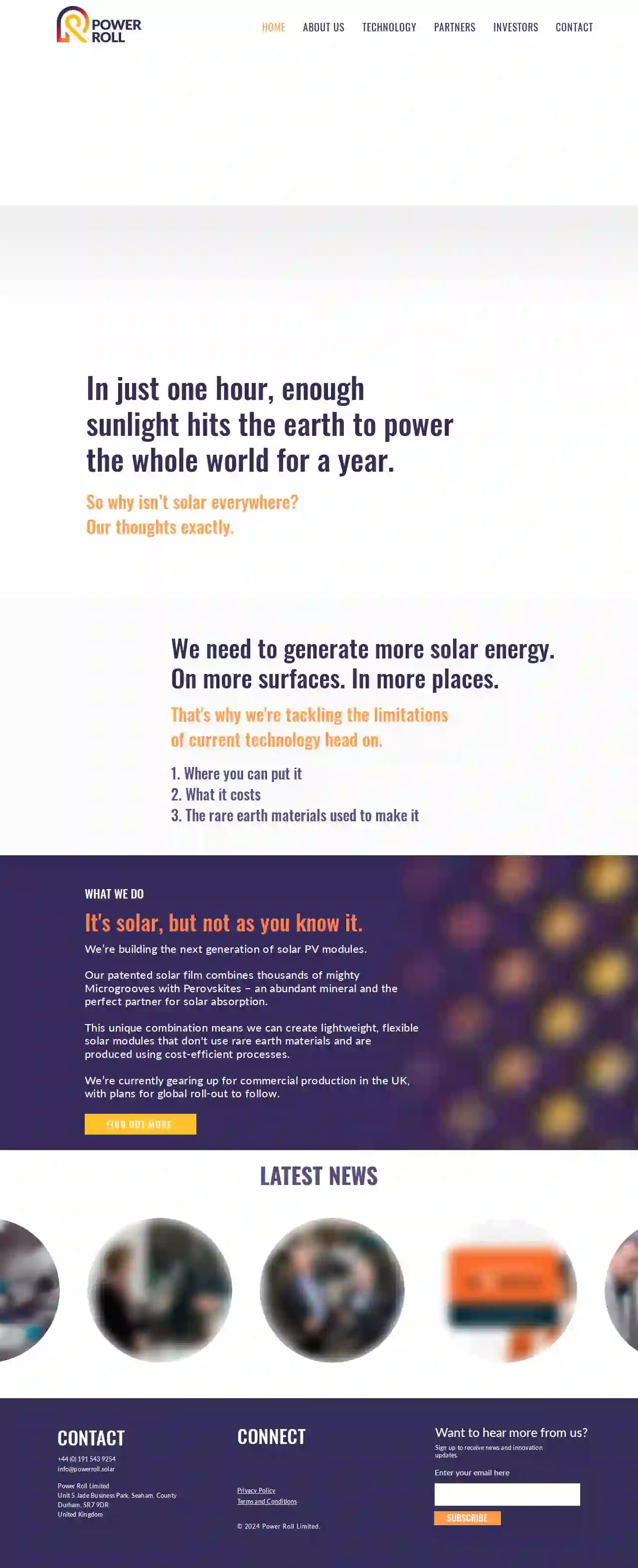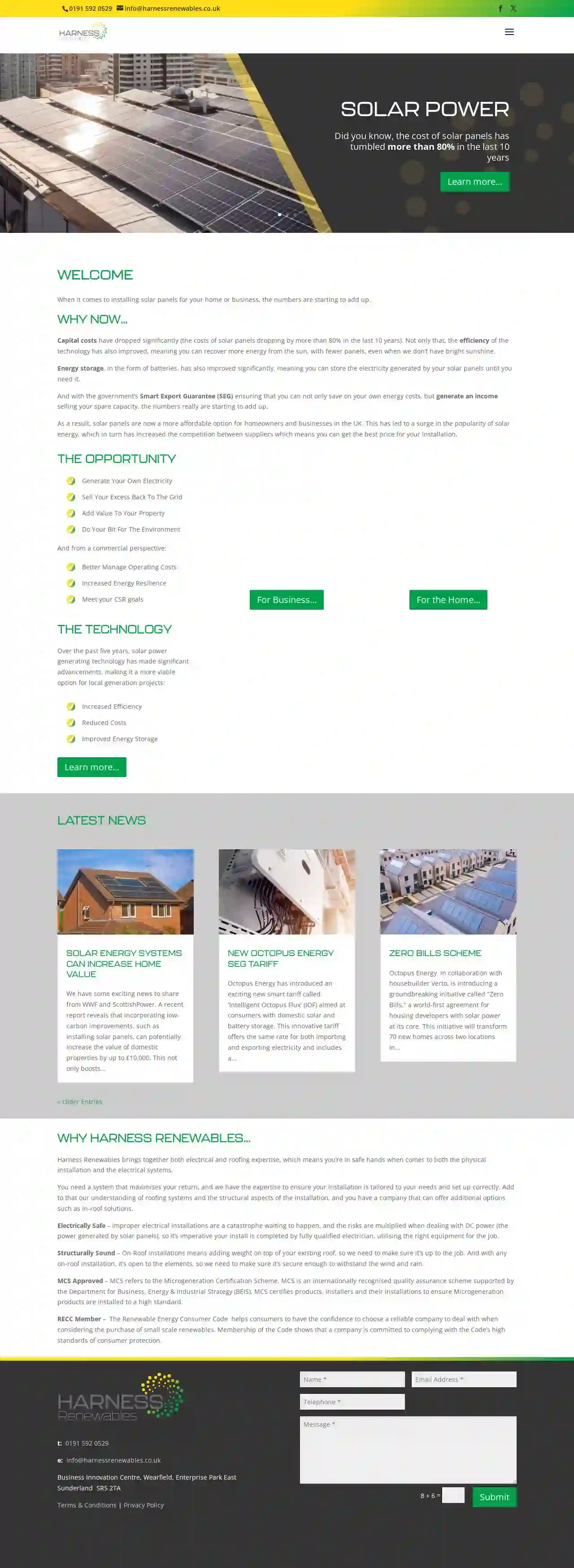Solar Installers Seaham
Top 10 Solar Installer in Seaham
Receive multiple Residential Solar Installers quotes for your project today! Compare profiles, reviews, accreditations, portfolio, etc... and choose the best deal.

Renewable Energy Management (REM)
515 reviews9 Westholme Terrace, Sunderland, SR2 9QA, GBRenewable Energy Management Ltd is a leading provider of comprehensive renewable energy solutions based in the North East of England. We're trusted installers of solar panels, battery storage, air source heat pumps, EV charging, ground source heat pumps and underfloor heating. Bringing sustainable energy to homes across the North East. GET A QUOTE
- Services
- Why Us?
- Gallery
Get Quote
Power Roll Ltd
Unit 5 Jade Business Park, Seaham, SR7 9DR, GBIn just one hour, enough sunlight hits the earth to power the whole world for a year. So why isn’t solar everywhere? Our thoughts exactly. We need to generate more solar energy. On more surfaces. In more places. That's why we're tackling the limitations of current technology head on. 1. Where you can put it 2. What it costs 3. The rare earth materials used to make it WHAT WE DO It's solar, but not as you know it. We’re building the next generation of solar PV modules. Our patented solar film combines thousands of mighty Microgrooves with Perovskites – an abundant mineral and the perfect partner for solar absorption. This unique combination means we can create lightweight, flexible solar modules that don't use rare earth materials and are produced using cost-efficient processes. We’re currently gearing up for commercial production in the UK, with plans for global roll-out to follow. FIND OUT MORE
- Services
- Why Us?
- Gallery
Get Quote
Better Living Energy
513 reviewsUnit 5, St Andrews Trade Park, Durham, DH1 2QX, GBYour Local Solar Panel Installers Servicing North East England Find out more about the benefits of solar panels, without the sales pitch. Get your no-obligation quote from our team today. We keep things simple, not salesy. Watch our quick video to find out more There’s a wide range of benefits that come from having solar panels and batteries installed in your home. The main reason is that it costs you nothing to generate this energy, which can help to reduce your energy bills and reliance on the national energy grid. You can also reduce your carbon emissions by opting to use more renewable sources of energy like solar panels and batteries. Another reason for getting solar panels installed is that if you don’t use this energy and export it back to the grid instead, you get paid for generating it! By storing surplus energy produced by the panels for later in the day, you can become more self-sufficient with your energy consumption and much less reliant on the energy grid – as well as reducing your energy bills! See how you can reduce your bills, reliance on the grid and your carbon footprint by switching to solar battery storage today.
- Services
- Why Us?
- Accreditations
- Our Team
- Testimonials
- Gallery
Get Quote
ALMAE Automation and Renewable Energy Ltd
53 reviews1 Oaktree Drive, Sunderland, SR32AE, GBAt ALMAE Automation and Renewable Energy Ltd, we provide specialized electrical services that include solar power with battery energy storage systems. We are also trained experts in smart automation and control systems. Our values ensure that we provide a reliable and transparent service. We are a leader in solar and battery storage systems, qualified and competent in both the design and installation. We are certified members of both RECC and MCS governing schemes. With over 20 years of experience in the electrical automation field, we are proud partners of Loxone Automation. We are committed to transparency, accountability, and safety in all our services. We are open and honest throughout our services, making sure the customer can make an informed decision. We share and make all relevant information available at all times. Our work is assessed every year by our governing bodies, ensuring a high standard of quality in our work. We keep our processes and staff up to date with our ever-changing world. Our philosophy is that we "make the time to complete each job safely".
- Services
- Why Us?
- Accreditations
- Testimonials
- Gallery
Get Quote
Flowing Energy Solutions
4.510 reviews2 Monument Park, Pattinson Industrial Estate, Washington, NE38 8QU, GBFlowing Energy Solutions is a company that provides energy solutions to homeowners in the North East. With over 40 years of experience in the construction industry, they offer a range of services including solar panels, battery storage, and EV charging points. Their mission is to provide high-quality energy solutions that help reduce carbon footprint and create a greener tomorrow. They believe in providing cost-effective and time-efficient solutions that save customers money and time. Flowing Energy Solutions is a trading name of Flowing Construction Services Ltd, which is a MCS Approved Solar and Battery Installer and TrustMark registered company.
- Services
- Why Us?
- Accreditations
- Gallery
Get Quote- Su
Sustainable Energy Engineering
4.982 reviewsDurham, GB- Services
- Why Us?
Get Quote - ES
ESE Solar County Durham
530 reviewsDurham, GB- Services
- Why Us?
Get Quote - Ar
Armstrong Renewables Ltd
4.714 reviewsDurham, GB- Services
- Why Us?
Get Quote - St
Stratton Energy Limited
55 reviewsDurham, GB- Services
- Why Us?
Get Quote 
Harness Renewables
Durham, GB- Services
- Why Us?
- Gallery
Get Quote
Over 3,485+ Solar Contractors on our platform
Our solar experts operate in Seaham and surroundings!
SolarCompaniesHub has curated and vetted Top Solar Installers arround Seaham. Find a trustworthy contractor today.
Frequently Asked Questions About Solar Installers
- Solar Panel Warranty: From the panel manufacturer, typically covering defects in materials and workmanship for 10-25 years. Some manufacturers offer performance guarantees, ensuring a certain level of energy output over time.
- Solar Installation Warranty: From the solar installer, covering the quality of the installation work for 1-10 years. This warranty protects you from leaks, faulty wiring, or other issues caused by improper installation.
- Keep Panels Clean: Clean panels periodically to remove dirt, debris, and bird droppings, which can reduce efficiency. Rainfall usually cleans panels adequately, but you might need to hose them down occasionally.
- Visual Inspections: Regularly inspect panels for signs of damage, loose wiring, or other issues.
- Professional Maintenance: Consider having a professional solar installer inspect your system every few years to ensure optimal performance.
Do I need planning permission to install solar panels in UK?
What kind of warranty should I expect for my solar panel system?
What happens to my solar panels during a power outage?
How do I maintain my solar panels?
Do I need planning permission to install solar panels in UK?
What kind of warranty should I expect for my solar panel system?
- Solar Panel Warranty: From the panel manufacturer, typically covering defects in materials and workmanship for 10-25 years. Some manufacturers offer performance guarantees, ensuring a certain level of energy output over time.
- Solar Installation Warranty: From the solar installer, covering the quality of the installation work for 1-10 years. This warranty protects you from leaks, faulty wiring, or other issues caused by improper installation.
What happens to my solar panels during a power outage?
How do I maintain my solar panels?
- Keep Panels Clean: Clean panels periodically to remove dirt, debris, and bird droppings, which can reduce efficiency. Rainfall usually cleans panels adequately, but you might need to hose them down occasionally.
- Visual Inspections: Regularly inspect panels for signs of damage, loose wiring, or other issues.
- Professional Maintenance: Consider having a professional solar installer inspect your system every few years to ensure optimal performance.